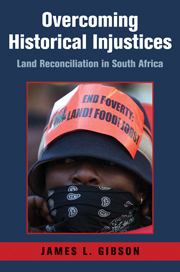Book contents
- Frontmatter
- Contents
- List of Figures
- List of Tables
- Preface and Acknowledgments
- 1 Land Reconciliation and Theories of Justice, Past and Present
- 2 Naming, Blaming, and Claiming on Historical Land Injustices: The Views of the South African People
- 3 Group Identities and Land Policy Preferences
- 4 Applied Justice Judgments: The Problem of Squatting
- 5 Judging the Past: Historical versus Contemporary Claims to Land
- 6 Land Reconciliation and Theories of Justice
- Appendix A A Note on Race in South Africa
- Appendix B The Survey Methodology
- Appendix C The Questionnaire
- References
- Index
- CAMBRIDGE STUDIES IN PUBLIC OPINION AND POLITICAL PSYCHOLOGY
5 - Judging the Past: Historical versus Contemporary Claims to Land
Published online by Cambridge University Press: 27 July 2009
- Frontmatter
- Contents
- List of Figures
- List of Tables
- Preface and Acknowledgments
- 1 Land Reconciliation and Theories of Justice, Past and Present
- 2 Naming, Blaming, and Claiming on Historical Land Injustices: The Views of the South African People
- 3 Group Identities and Land Policy Preferences
- 4 Applied Justice Judgments: The Problem of Squatting
- 5 Judging the Past: Historical versus Contemporary Claims to Land
- 6 Land Reconciliation and Theories of Justice
- Appendix A A Note on Race in South Africa
- Appendix B The Survey Methodology
- Appendix C The Questionnaire
- References
- Index
- CAMBRIDGE STUDIES IN PUBLIC OPINION AND POLITICAL PSYCHOLOGY
Summary
The vignette reported in Chapter 4 concerned an interracial conflict over land. We saw enormous racial differences in the reactions to the events portrayed in that scenario; nearly everything about the conflict seemed to be defined in terms of race, at least in the minds of most respondents. Consequently, it is perhaps not surprising that group identities seemed to have been activated by the dispute and that they played an important role in how people judged the controversy.
However, with interracial conflict essentially a constant in that vignette, it is not possible to assess how powerful a role race plays. That is, the type of conflict portrayed in the vignette was the same for all respondents; therefore, this constant could not account for variability in the assessments of the vignette (constants cannot explain variables). A more powerful means of estimating the role of race in identity activation would be to vary the nature of the land conflict from interracial to intraracial. That is precisely the nature of the experimental vignette reported in this chapter.
The purpose of this chapter is therefore to investigate the conflict between claims of injustice grounded in the past versus those grounded in the present, while varying the racial context of the dispute. In order to do so, a second experiment was employed. This vignette includes a manipulation of the races of the disputants in a historical land conflict.
- Type
- Chapter
- Information
- Overcoming Historical InjusticesLand Reconciliation in South Africa, pp. 169 - 210Publisher: Cambridge University PressPrint publication year: 2009



